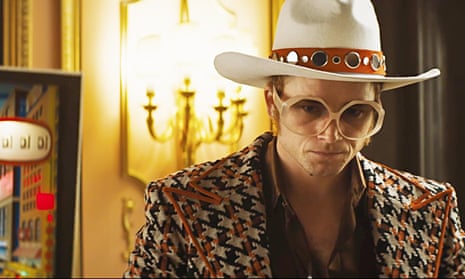Rocketman, the Elton John biopic, has been applauded for its raw portrayal of the singer’s heavy drug use and its surreal rendering of his suicide attempt conveying the dream-like state of John’s reality. These scenes are necessary to a faithful account of John’s life, but their inclusion prompts the question: should trigger warnings be issued before the film? In New Zealand, the classification of last year’s A Star Is Born was changed to include an explicit suicide warning after two young people were “severely triggered” by the film. There were also calls for Alfonso Cuarón’s Roma to include trigger warnings for a particularly distressing scene that the actors themselves were unaware would be included.
Although the events of John’s life are no secret, it was never certain what would and wouldn’t be included in the film. In contrast, Bohemian Rhapsody barely touches on Freddie Mercury’s heavy drug use; a mound of suspicious-looking white powder shown once is supposedly symbolic of years of addiction. Rocketman is certainly sensitive in its portrayal of addiction, mental illness and suicide; even so, trigger warnings might have demonstrated an understanding that no two viewers will experience a film in the same way.
It is baffling why trigger warnings have become such a heated topic. At its most basic, the concept is to warn viewers of any potentially upsetting content. The path to recovery from trauma is never linear, and the smallest and seemingly most insignificant thing can be enough to set you back. Originating on sites such as Tumblr, trigger warnings were a well-intentioned indication that distressing topics – sexual harassment, rape, abuse – were to be addressed.

There is an argument that because films have classifications, there is no need for trigger warnings. However, classifications aren’t specific enough: “violence” covers all manner of sins; rape comes under a generalised category of “sexual violence”. Trigger warnings further help viewers decide whether they want to see the film.
It’s arguable that trigger warnings are in effect spoiler alerts. As a frequent cinemagoer, I want to experience a film without prior knowledge or preconceptions. But is a little trigger warning really going to spoil a trip to the cinema? It’s ironic that critics of trigger warnings often come across whinier than those they attack. Is your personal viewing experience so precious that you can’t consider the mental health of your fellow audience members?
Art has always been a space to discuss social issues. But for too long they have been exempt from the change and progress demanded from other parts of society. By defending creative freedom and freedom of speech, critics of trigger warnings champion the rights of the creator over those of their audiences, and the gap between the intention of a film and its effect is often forgotten. The rape-revenge film Elle, for example, might be intended as a critique of patriarchal sexual violence, but its graphic scenes are arresting at best, triggering at worst.
It’s not that these films shouldn’t be made, just that it is the responsibility of the industry that they should be prefaced with appropriate warnings. Trigger warnings are about being considerate of audiences. Who’s more “snowflake”: younger audiences expecting compassion or older ones – who ought to know better – complaining their movie has been spoiled?
